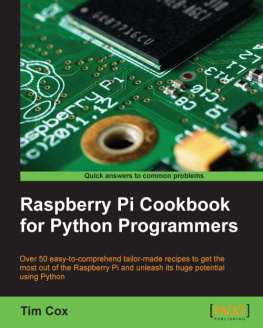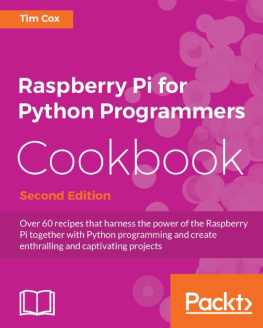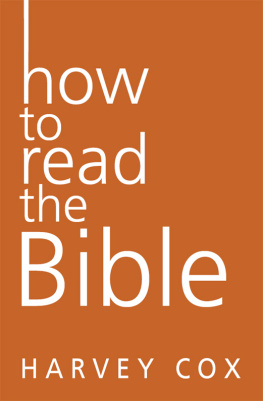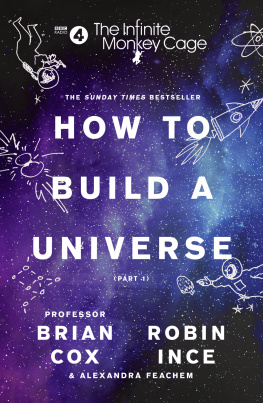Cox - Python for Beginners: The Crash Course to Learn Python Programming in 3-DAYS (or less) Master Artificial Intelligence for Data Science and Machine Learning + Practical Exercises
Here you can read online Cox - Python for Beginners: The Crash Course to Learn Python Programming in 3-DAYS (or less) Master Artificial Intelligence for Data Science and Machine Learning + Practical Exercises full text of the book (entire story) in english for free. Download pdf and epub, get meaning, cover and reviews about this ebook. year: 2020, genre: Computer. Description of the work, (preface) as well as reviews are available. Best literature library LitArk.com created for fans of good reading and offers a wide selection of genres:
Romance novel
Science fiction
Adventure
Detective
Science
History
Home and family
Prose
Art
Politics
Computer
Non-fiction
Religion
Business
Children
Humor
Choose a favorite category and find really read worthwhile books. Enjoy immersion in the world of imagination, feel the emotions of the characters or learn something new for yourself, make an fascinating discovery.

Python for Beginners: The Crash Course to Learn Python Programming in 3-DAYS (or less) Master Artificial Intelligence for Data Science and Machine Learning + Practical Exercises: summary, description and annotation
We offer to read an annotation, description, summary or preface (depends on what the author of the book "Python for Beginners: The Crash Course to Learn Python Programming in 3-DAYS (or less) Master Artificial Intelligence for Data Science and Machine Learning + Practical Exercises" wrote himself). If you haven't found the necessary information about the book — write in the comments, we will try to find it.
Cox: author's other books
Who wrote Python for Beginners: The Crash Course to Learn Python Programming in 3-DAYS (or less) Master Artificial Intelligence for Data Science and Machine Learning + Practical Exercises? Find out the surname, the name of the author of the book and a list of all author's works by series.
Python for Beginners: The Crash Course to Learn Python Programming in 3-DAYS (or less) Master Artificial Intelligence for Data Science and Machine Learning + Practical Exercises — read online for free the complete book (whole text) full work
Below is the text of the book, divided by pages. System saving the place of the last page read, allows you to conveniently read the book "Python for Beginners: The Crash Course to Learn Python Programming in 3-DAYS (or less) Master Artificial Intelligence for Data Science and Machine Learning + Practical Exercises" online for free, without having to search again every time where you left off. Put a bookmark, and you can go to the page where you finished reading at any time.
Font size:
Interval:
Bookmark:
- Computer: Like I said, obvious! You need a machine of your own to download and practice the material and matter you learn from here. To make the most out of the this, practice as you read. This greatly increases your confidence and allows you to keep a steady pace. The specifications do not matter much. Most of the modern machines (2012 and above) should be able to run each of the components without posing any problem.
- An internet connection: You will be required to download a few files from the internet.
- An Integrated Development Environment (IDE): If, for some reason, you felt intimidated by this terminology, relax! I will be guiding you through each and every step to ensure you have all of these and know what they are all about. For now, just imagine this as a text editor.
- A fresh mind: There is no point in learning if your mind is not there with you. Be fresh, be comfortable. This may take a little practice and a little time, but it will all be worth it.
Font size:
Interval:
Bookmark:
Similar books «Python for Beginners: The Crash Course to Learn Python Programming in 3-DAYS (or less) Master Artificial Intelligence for Data Science and Machine Learning + Practical Exercises»
Look at similar books to Python for Beginners: The Crash Course to Learn Python Programming in 3-DAYS (or less) Master Artificial Intelligence for Data Science and Machine Learning + Practical Exercises. We have selected literature similar in name and meaning in the hope of providing readers with more options to find new, interesting, not yet read works.
Discussion, reviews of the book Python for Beginners: The Crash Course to Learn Python Programming in 3-DAYS (or less) Master Artificial Intelligence for Data Science and Machine Learning + Practical Exercises and just readers' own opinions. Leave your comments, write what you think about the work, its meaning or the main characters. Specify what exactly you liked and what you didn't like, and why you think so.






